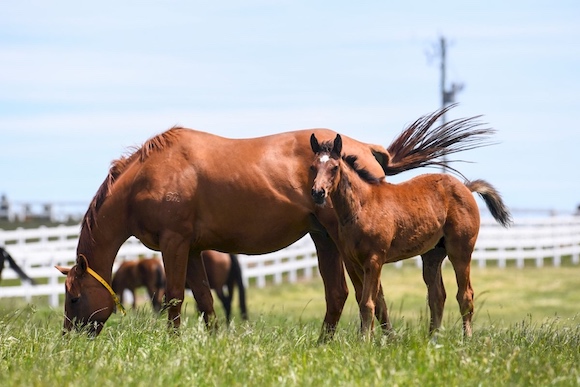
BABY ON BOARD?
Tailor nutrition now for the upcoming breeding season
Kentucky Equine Research
Spring is fast approaching. Soon paddocks will be flush with green and foals will be frolicking. However, a healthy mare, foal, and breeding stallion doesn’t happen by chance, and now, in the depths of winter, is the time to focus on some key aspects of nutrition to ensure all is well for the upcoming season.
Pregnant Mares
In the first five months of gestation, the mare can be happily maintained on her usual diet provided it is nutritionally balanced and she maintains her body weight. This is because the growing foal is very small during these early months of pregnancy. Even at seven months of pregnancy, the foal equals only about 20 percent of its weight at birth, which is less than two percent of the mare’s weight. During this time the foal’s nutrient requirements are miniscule compared with the mare’s own maintenance requirements. Therefore, the mare can be fed essentially the same as if she were not pregnant at all. All too often the well-meaning mare owner greatly increases feed intake after the mare is pronounced in foal, reasoning that she is now “eating for two.” This is not only unnecessary, but may lead to obesity and problems at foaling time.
Feed, but don’t overfeed or underfeed. Mares have increased energy (calorie) needs from about six months of gestation through to birth. Mares are expected to gain approximately 12-15% of their initial body weight during pregnancy, most of which typically occurs in late gestation (nine to eleven months). By the last month of pregnancy, an average mare will consume roughly 20-22% more calories over maintenance needs.
Mares that are too thin throughout pregnancy may have a prolonged gestation period and have depleted nutrient stores. For mares that require the extra calories, a higher intake breeding feed should be fed along with high quality roughage. Mares that are over weight can be maintained on a low-intake concentrated balancer pellet and roughage.
Protein, vitamin and mineral balance. Protein and mineral requirements increase to a greater extent in late pregnancy. This is because the foetal tissue being synthesised during this time is quite high in protein, calcium and phosphorus. Trace mineral supplementation is also very important during this period because this is the key period in which the foal stores iron, zinc, copper, and manganese in its liver for use during the first few months after it is born. The foal has developed this nutritional strategy of storing trace minerals during pregnancy because mare’s milk is quite low in these elements. Mares in late pregnancy are often overfed energy in an attempt to supply adequate protein and minerals to the developing foal. If the pregnant mare becomes fat during late pregnancy, she should be switched to a feed that is more concentrated in protein and minerals so that less can be fed per day. This will restrict her energy intake while ensuring that she receives adequate quantities of other key nutrients.
Targeted supplementation of mares. Over the years nutrition researchers have identified a few key nutrients which should be considered with feeding your pregnant mare including natural vitamin E and long-chain omega 3 fats.
Vitamin E to boost colostrum quality. Studies show that supplementing pregnant mares with natural vitamin E prior to foaling can boost the levels of infection-fighting proteins called immunoglobulins. It is important to note that natural vitamin E is 5 times more bioavailable than synthetic forms of E, so make sure you read the label on the supplement! Natural E is d-alpha tocopherol, synthetic is dl-alpha tocopherol.
Long chain omega-3 fats. Like vitamin E, supplementing pregnant mares with long chain omega-3 fatty acids also appears to improve the quality of colostrum. In fact, offering marine-derived omega-3 fats (DHA and EPA) packs colostrum with more than just immunoglobulins, they also increase docosahexaenoic acid (DHA) levels in milk.
Take care of the gut. As with all class of horse, pregnant mares are not immune to gastric disturbance. However, as many of the common gastric ulcer medications are not fully evaluated for pregnancy, prevention is better than cure. These measures include access to plenty of forage, minimising environmental stress, and avoiding high-starch and high-sugar feed. Use of a research-proven digestive supplement as part of an overall management program can support both foregut and hindgut health.
In summary, targeting nutrition of mares in the winter months can lead to a successful breeding season. Nutrition can play a significant role in the fertility, and the successful growth and development of the foal. As with all horses, it is highly recommended to seek the guidance of a qualified equine nutritionist to tailor a balanced diet for your horse’s individual needs.